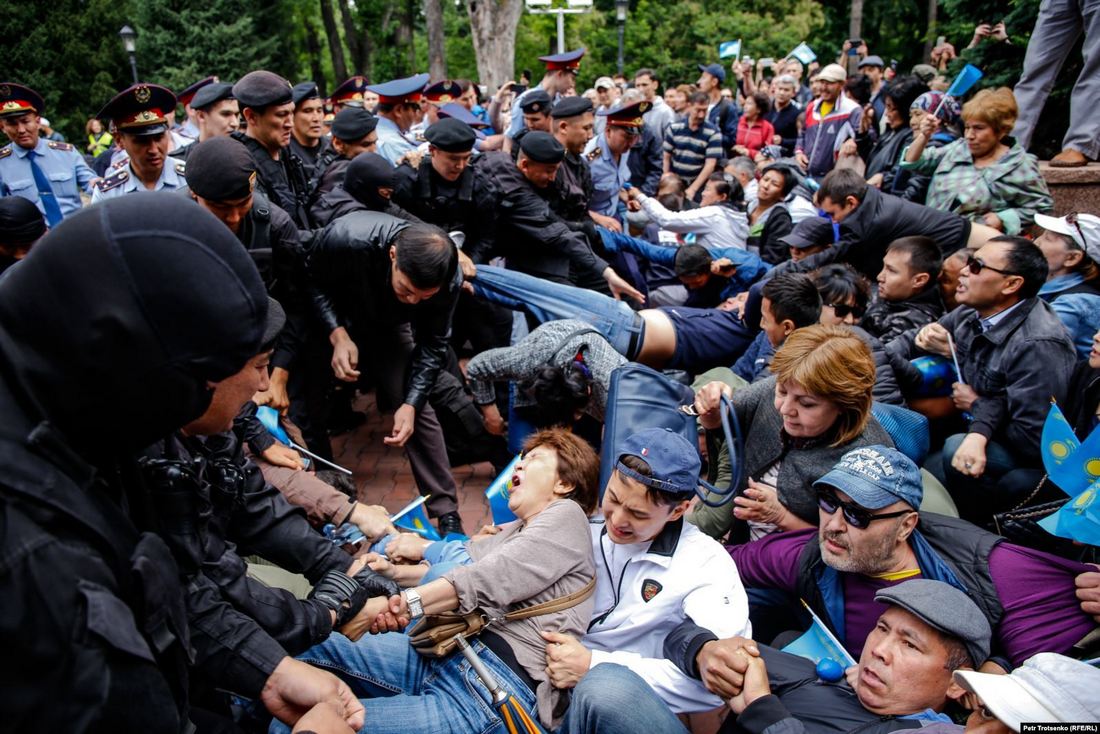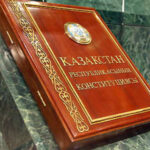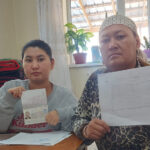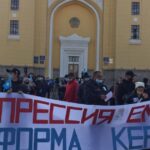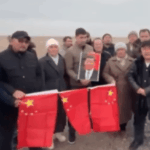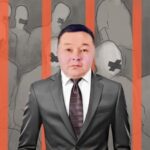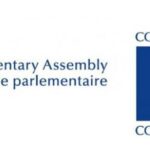At the beginning of next week, the European Union (EU) will hold a high-level meeting with the Central Asian governments in Dushanbe, the capital of Tajikistan. A coalition of five NGOs urge the EU to use this meeting to insist on concrete measures to address the unrelenting persecution of government critics; the reprehensible practice of politically-motivated prosecution and imprisonment; wide-ranging restrictions on access to information and free speech; and the repressive civil society environment in Central Asia.
The annual EU-Central Asia Ministerial Meeting is scheduled to take place in Dushanbe on 22 November 2021 with the participation of the EU’s High Representative for Foreign Affairs and Security Policy, Joseph Borrell and the foreign ministers of the Central Asian countries. At the meeting, the EU and the Central Asian governments will discuss different areas of cooperation, including cooperation on promoting human rights, the rule of law and democratic governance.
Ahead of the meeting, International Partnership for Human Rights, Kazakhstan International Bureau for Human Rights and Rule of Law, the Legal Prosperity Foundation, Turkmen Initiative for Human Rights and the Association for Human Rights in Central Asia have prepared a briefing paper documenting current key human rights concerns in the five Central Asian countries, which they urge the EU to raise with its Central Asian partners.
The joint NGO briefing paper documents how the Central Asian authorities continue to impose excessive restrictions on fundamental freedoms and implement harsh measures to prevent scrutiny and criticism of state policies as they battle with the fallout of the Covid-19 pandemic, economic and social challenges, and renewed security concerns arising from the recent developments in Afghanistan. Major, alarming trends covered in the paper include:
Persecution of government critics: Across the region, government critics are subjected to intimidation and harassment ranging from orchestrated online attacks, anonymous threats and surveillance to being summoned, prosecuted and convicted on trumped-up charges.
As Kyrgyzstan has taken an increasingly authoritarian turn following last year’s political crisis and President Sadyr Japarov’s rise to power, outspoken activists, journalists and lawyers have faced increased threats and harassment. Those targeted particularly include critics of the new controversial constitution, which significantly increased the president’s powers without providing for adequate checks and balances and reduced the role of parliament, due to be elected this month, more than a year after the cancellation of the results of the previous elections.
Despite President Shavkat Mirziyoyev’s pledges to promote democratic reform, the October 2021 presidential elections in Uzbekistan featured no genuine competition. Prior to the elections, opposition parties were denied registration and opposition members, bloggers and other government critics faced renewed pressure and harassment. This worrisome development continues after the elections, in which Mirziyoyev, as expected, was re-elected for a second term.
Under President Kassym-Jomart Tokayev, who came to power in 2019, the authorities in Kazakhstan continue to suppress political opposition and crack down on government critics. The authorities have particularly stepped up their campaign against people accused of participating in or supporting opposition movements banned as purportedly ‘’extremist’’, holding them to account for peaceful actions of expression and protest.
The authorities of Turkmenistan have targeted dissidents both at home and abroad as part of a widening crackdown unleashed in response to growing expressions of discontent on social media and during protests held by diaspora communities. Any citizen who openly criticises the situation in the closed country, ruled by President Gurbanguly Berdymukhamedov, risks repercussions, as do their relatives.
Under the entrenched authoritarian rule of President Emomali Rahmon in Tajikistan, persecution of members of the political opposition is ongoing. Independent journalists, and lawyers continue to be targeted by intimidation and reprisals for their work on politically sensitive issues and cases.
Pattern of politically motivated persecution and imprisonment: The ongoing pattern of politically motivated prosecution and imprisonment of activists, journalists and lawyers following unfair trials is of serious concern across the region.
In Kazakhstan, a prominent victim of this practice, poet-dissident Aron Atabek was released in October 2021 after spending more than 15 years in prison. His harsh prison experience has taken a heavy toll, leaving him seriously debilitated, and shortly after his release he was hospitalised in intensive care due to Covid-19 related pneumonia. He remains in a critical condition.
The authorities of Kyrgyzstan have to date failed to ensure an impartial and effective investigation into last year’s death in prison of human rights defender Azimjan Askarov, and no one has been held accountable for this tragic outcome. Askarov died due to Covid-19 related pneumonia after unjustly spending ten years behind bars. The authorities recently reopened the investigation into his death, but serious concerns about its nature remain.
In Tajikistan, lawyer Buzurgmehr Yorov continues to serve a lengthy prison sentence, which was handed down to him in closed and unfair proceedings after he defended high-ranking opposition members in 2015. His co-defendant, lawyer Nuriddin Mahkamov also remains in prison on charges considered politically motivated.
In Turkmenistan, journalist Nurgeldy Khalykovwas imprisoned last year in retaliation for his cooperation with a Turkmenistan-covering organisation based in exile, while doctor Khursanai Ismatullaeva was prosecuted this summer after seeking help from exile-based human rights groups in her struggle to obtain justice for her unfair dismissal from a medical clinic. The authorities have also sought the return of activists based abroad, putting them at a serious risk of prosecution and imprisonment on trumped-up charges and other rights violations if returned.
In Uzbekistan, blogger Miraziz Bazarov is facing trumped-up criminal charges after criticising the lack of transparency in the government’s use of Covid-19 related loans and the double standards amongst officials in relation to LGBTI people.Another blogger, Otabek Sattoriy was imprisoned earlier this year on charges believed to have been fabricated to punish him for speaking out on corruption among local officials.
The individuals mentioned above are only a few of those who have been prosecuted and imprisoned on politically motivated charges in the region; there are many other victims of this practice, too.
Withholding information of public interest and restricting free speech: The Central Asian authorities continue to prevent access to information on issues of public importance, including public health issues in the context of the global Covid-19 pandemic. This problem has been particularly prevalent in Turkmenistan, whose government has consistently denied and covered up the national Covid-19 outbreak throughout the pandemic. The Tajikistani government has also failed to adopt a transparent approach about the pandemic, claiming victory over it earlier this year and denying the occurrence of new Covid-19 cases for months before being forced to admit that there was a new wave.
The pattern of muzzling independent media continues and the Central Asian authorities use various tactics to obstruct the dissemination and exchange of information critical of those in power on online platforms. The authorities have blocked access to independent news sites, social media and other internet resources and initiated other measures restricting the operation of online resources, using arguments such as national security concerns, personal data considerations, and the protection of children.
The Central Asian authorities have also misused the fight against ‘’disinformation” to restrict legitimate free speech on and offline. In Kazakhstan, a pre-existing criminal code provision on “knowingly disseminating false information” has been used to stifle criticism, along with other overly broad criminal charges. In Kyrgyzstan, Tajikistan and Uzbekistan, new vaguely worded legislation banning the dissemination of “false’’ information has been enacted with negative implications especially in relation to online discussions. The Turkmenistani authorities consider any information challenging the government narrative “false” and seek to prevent access to such information through internet censorship and intimidation.
Repressive civil society environment: The operating environment for civil society organisations remains highly challenging across the region. Excessive state oversight of NGOs is an ongoing problem, and it is of particular concern that legislation setting out financial reporting obligations might be implemented in a way that restricts the legitimate activities of NGOs. For example, ahead of the January 2021 parliamentary elections, leading human rights NGOs in Kazakhstan were threatened with suspension because of alleged minor, technical mistakes made when reporting about foreign grants. The recent adoption of legislation introducing a new financial reporting scheme for NGOs in Kyrgyzstan has prompted concerns that a similar scenario might occur there. The Tajikistani authorities have arbitrarily applied tax legislation to harass independent civil society organisations, requiring them to pay income tax on foreign grants, although this is not provided for by law.
Contrary to its commitment to improve the operating space for civil society, the Uzbekistani government continues to deny compulsory state registration to newly established, independent NGOs on technical and unsubstantiated grounds. For example, the NGO Human Rights House was denied registration for the eighth time in August 2021, and the following month a local court refused to review the group’s complaint against the government’s refusal to register it. No independent human rights NGOs are able to operate inside Turkmenistan, and the clandestine contributors of exile-based NGOs work at great risk. Exile-based groups have also been subjected to pressure, including inference with their website operations and social media content takedowns due to government abuse of mechanisms for reporting copyright violations.
Across the region, human rights NGOs face widespread mistrust, with arguments about defending national security and so-called traditional values being used by decisionmakers, aggressively-minded activists and online trolls to stigmatise, discredit and intimidate groups advocating for the rights of women, LGBT and other vulnerable groups.
More information about these and other current trends in the five countries of the region can be found by downloading the full paper, entitled No space for criticism: Excessive restrictions on fundamental rights in Central Asia.

